Jiming Temple
The Jiming Temple (simplified Chinese: 鸡鸣寺; traditional Chinese: 雞鳴寺; pinyin: Jīmíng Sì) is a renowned Buddhist temple in Nanjing, Jiangsu, China. One of the oldest temples in Nanjing,[1] it is located in the Xuanwu District near Xuanwu Lake.[2]
| Jiming Temple | |
|---|---|
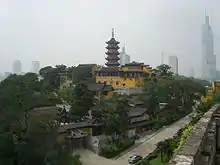 Jiming Temple | |
| Religion | |
| Affiliation | Buddhism |
| Location | |
| Country | China |
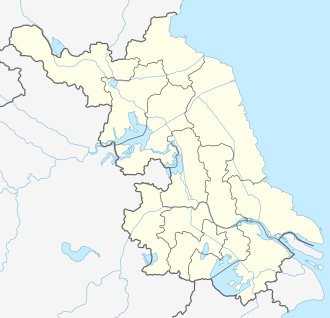 Location in Jiangsu | |
| Geographic coordinates | 32°03′47″N 118°47′24″E |
| Architecture | |
| Completed | 527 |
History
The temple, which literally means "rooster crowing" was first constructed in 527 during the Liang dynasty and has been destroyed and reconstructed many times. The existing temple was initially constructed during the Ming dynasty[3] during the reign of the Hongwu Emperor in 1387.[4] It was destroyed during the Taiping Rebellion but was rebuilt later.
By 1931 most temple buildings had been appropriated as barracks by police and army of the Nationalist government of Republican China. The main hall had been emptied completely apart from the large Buddha statue. Only one hall, near the city wall was still being used for worship. The temple remained popular primarily because of its tea house which was also situated in that hall.[5]
Description
Within the temple are Guanyin Hall (观音殿), Huomeng Building (豁蒙楼), and the Medicine Buddha Pagoda (Chinese: 药师佛塔). The Rouge Well (胭脂井), got its name from a legend that the emperor of the Southern Tang Dynasty and his concubine hid themselves in the well to escape enemy pursuit. The stains of rouge were left on the well: hence the name of Rouge Well.
The seven-story pagoda overlooks Xuanwu Lake. There is an entrance to the Nanjing City Wall from the rear of the temple.[2] Behind the temple there remains a section of palace wall called Taicheng.
It is the busiest temple in Nanjing, particularly during the Lunar New Year.[3]
The newly opened Line 3 metro line has a stop for the temple called Jimingsi
 Jiming Temple entrance
Jiming Temple entrance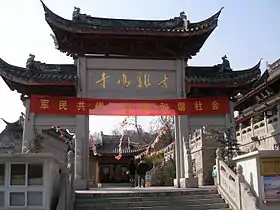 Jiming Temple entrance
Jiming Temple entrance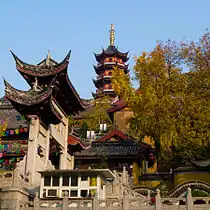 Jiming Temple
Jiming Temple Pagoda
Pagoda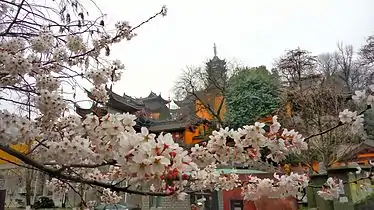 The area around Jiming Temple blooms with cherry blossoms in late February
The area around Jiming Temple blooms with cherry blossoms in late February
References
- 寺院介绍 [Jiming Temple introduction]. Jiming Temple. Retrieved May 15, 2014.
- Lonely Planet. Lonely Planet Jiangsu: Chapter from China Travel Guide. Lonely Planet; 1 June 2012. ISBN 978-1-74321-274-5. PT14.
- Chung Wah Chow; David Eimer; Carolyn B. Heller. China. Lonely Planet; 2009. ISBN 978-1-74220-325-6. p. 283.
- Nanjing Scenic Spots. Meet China.
- Krug, Hans Joachim (*1893); Wanderungen und Wandlungen in China; Berlin 1941 (Scherl), p. 42-3 (based on a visit in spring 1931)
External links
| Wikimedia Commons has media related to Jiming Temple. |
- 寺院介绍 (Jiming Temple) (Chinese and English)
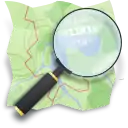 Geographic data related to Jiming Temple at OpenStreetMap
Geographic data related to Jiming Temple at OpenStreetMap
